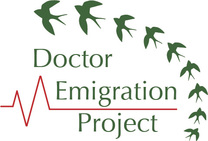Doctor Emigration Project
|
|
Doctor Emigration Project (2014-2016)
In 2014 RCSI (Prof. Ruairi Brugha and Dr. Niamh Humphries) obtained HRB funding to conduct a 3 year (2014-16) research project on doctor emigration.
The Doctor Emigration Project will consider the outward migration or emigration of doctors from the Irish health system. Although Ireland now trains sufficient doctors to meet the needs of the Irish health system, increasing numbers are emigrating. High levels of doctor migration (inward and outward) distorts the composition and skills mix of the health workforce and undermine attempts to match supply to need. The Doctor Emigration Project will describe and analyse the emigration patterns of non-consultant hospital doctors (NCHDs) involved in postgraduate training. It will measure the scale of emigration and identify trends; explore and analyse associated and contributory factors; and identify the measures with the greatest potential to retain and attract back emigrant doctors into the Irish health system. This project uses a mixed methods design. The research team has gathered quantitative data (via the 2014 Your Training Counts (YTC) survey) and carried out qualitative interviews with trainee doctors. Background on the project phases, design and methodologies can be accessed here. The project uses this data to explore doctors’ career decision-making and compare emigration intentions with emigration behaviour over time. This will provide Irish health workforce planners with a more robust evidence base for predicting and understanding emigration dynamics and drivers, during and at the end of specialist training. The Doctor Emigration Project team will use research findings to support key stakeholders (notably the HSE National Doctors Training and Planning (NDTP) and the Medical Council of Ireland (MCI)) in developing feasible strategies to retain and attract back doctors. In turn, this will improve Ireland’s medical workforce self-sufficiency, reduce the waste of public resources in undergraduate and postgraduate training; and enable Ireland to fulfil its global responsibilities. For further information on the Doctor Emigration Project, please contact. For those taking part in the Your Training Counts 2016 Survey, please click the link below. The Project so far
Phase 1 – The Doctor Emigration Project has included some questions on career and migration intentions within the Medical Council of Ireland (MCI) “Your Training Counts” National Trainee Experience Survey 2014/2015. With participants consent, this data has been shared with the Doctor Emigration Project. Many participants from the YTC 2014 survey also agreed to be contacted by the Doctor Emigration Project for a follow up survey or interview. We would encourage you to complete the “Your Training Counts” Survey for the coming year (2016). Phase 2 - Qualitative interviews with trainee doctors Qualitative in-depth interviews have been undertaken with NCHDs training in Ireland. Interviews were conducted with a sample of 50 doctors from the original cohort (2014) who remained working in the Irish health system (including doctors who intended to emigrate and doctors who intended to remain) and with doctors who have since emigrated. Phase 3 - This is a follow-up online survey which will be carried out with those who completed the YTC survey in 2014 and agreed to be contacted by the Doctor Emigration Project. Information on the survey can be accessed here. Your input will provide a better understanding of doctor emigration. We encourage you to participate and make your voice heard! Thank you, Doctor Emigration Research Team QuestionsWill the research make a difference?
Prof Ruairí Brugha has been working closely with the Medical Council and HSE National Doctors Training and Planning (NDTP - formerly HSE MET) over the last 2 years. All are committed to making sure that the research findings make a difference, i.e. that doctors’ views are taken seriously when it comes to designing training and creating career paths. We also have direct links to the Department of Health. What will participation involve?
We are now in the final phase of the research. This is an online survey which will take between 10 to 15 minutes of your time. |

